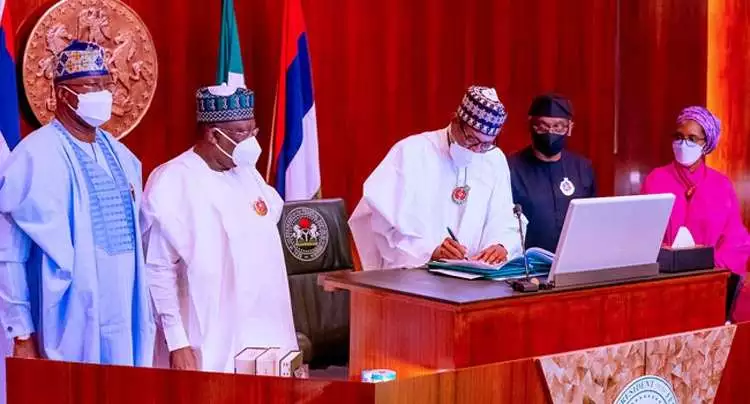Flanked by members of the Federal Executive Council and leaders of the National Assembly, President Muhammadu Buhari fulfilled his promise when, on Friday, in Abuja, he signed into law both the 2022 Appropriation Bill and the 2021 Finance Bill.
The Presidency has indicated it will sign the bill Friday after it was submitted by the National Assembly before they went on recess.
The newly signed 2022 Budget provides expenditure framework for N17.127 trillion which was increased by N735.85 billion over and above the initial Executive Proposal for a total expenditure of N16.391 trillion. The increase, according to him, was effected by the Executive arm of the government represented by the Minister of Budget and Planning and its Finance counterpart.
“The Minister will provide the public with the details of the budget as passed by the National Assembly, and signed into law by me” Buhari said.
While signing the budget, the President, however, grumbled about what he described as worrisome changes introduced by the National Assembly into the proposal.
Garba Shehu, Presidential spokesperson, said Friday that the President will revert to the National Assembly with requests for changes after they resume from yuletide break.
“It is in this regard that I must express my reservations about many of the changes that the National Assembly has made to the 2022 Executive Budget proposal, ” the president said.
“Some of the worrisome changes are as follows:
“Increase in projected FGN Independent Revenue by N400 billion, the justification for which is yet to be provided to the Executive:
“Reduction in the provision for Sinking Fund to Retire Maturing Bonds by N22 billion without any explanation;
“Reduction of the provisions for the Non-Regular Allowances of the Nigerian Police Force and the Nigerian Navy by N15 billion and N5 billion respectively.
” This is particularly worrisome because personnel cost provisions are based on agencies’ nominal roll and approved salaries/allowances;
“Furthermore, an increase of N21.72 billion in the Overhead budgets of some MDAs, while the sum of N1.96 billion was cut from the provision for some MDAs without apparent justification;
“Increase in the provision for Capital spending (excluding Capital share in Statutory Transfer) by a net amount of N575.63 billion, from N4.89 trillion to N5.47 trillion.”
Part of his concern is the reductions in provisions for some critical infrastructure, including but not limited to N12.6 billion for the Rail Modernisation projects; N25.8 billion from Power Sector Reform Programme and N14.5 billion from several other projects which are part of the submissions of the Ministry of Agriculture.
Discover more from The Source
Subscribe to get the latest posts sent to your email.








